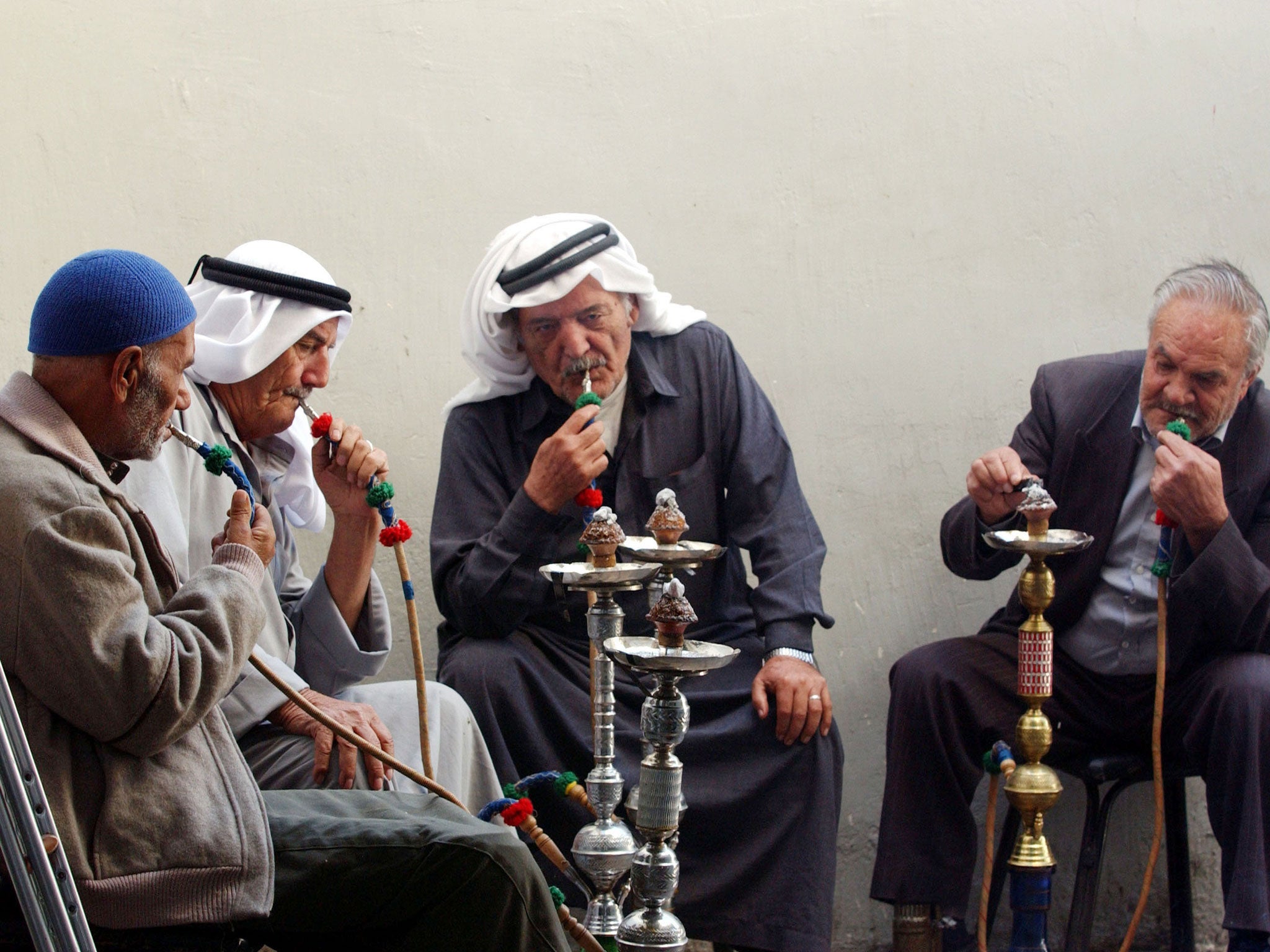The Independent's journalism is supported by our readers. When you purchase through links on our site, we may earn commission.
Robert Fisk: A misty-eyed farewell to Lebanon's smoky nargile dens
Long View: Against expectation, Lebanon’s anti-smoking campaign has been a success and one of the region's longest lasting habits is finally coming to an end


Who could have believed the Lebanese would stop smoking? Law 174 is actually being obeyed. No smoking in any restaurants or cafes. Even the blessed nargile is banned, the glorious water pipe that originated in early 16th century India. There may be a civil war next door and 336,000 Syrian refugees in Lebanon but a nation famed for its smokers appears to be giving it all up. It doesn’t hurt that Michael Bloomberg, the New York city mayor, has sent £400,000 to Lebanon’s anti-smoking campaign. But what’s amazing is that smoking a pipe was one of Lebanon’s – and Syria’s – longest lasting habits.
I am indebted here to Christian Sassmannshausen, a PhD student in Islamic Studies at the Freie Universitat of Berlin whose wonderful article “The Stuff of History: Everyday Objects, the Construction of Ambiguous Meanings and the ‘Afterlife’ of Social Things” appears in an equally wonderful book on Islamic Art in museums and who traces the history of popular smoking in the Levant. The consumption of tobacco, he writes – and let’s call him Christian and be done with it – started as a luxury for the affluent, but by the late nineteenth century just about everyone was smoking.
He quotes a 19th century writer called Jessup: “Do the Syrian people all smoke? Almost all of them. They speak of it as ‘drinking a pipe, drinking a cigar’ and you would think that they look upon tobacco as being as necessary to them as water. Old and young men, women and even children smoke, smoke while they work or rest…They even measure time by their pipes so that if you ask the distance to a point in a journey, the answer very likely will be, it is two, or three, or five pipes distant…The Orientals [sic] spend so much time smoking that someone has said ‘the Moslims [sic] came into power with the Koran in one hand, and the sword in the other, but will go out with the Koran in one hand and the pipe in the other!’”
Lebanon, back in those days, was part of Syria and one of Tripoli’s major exports was tobacco (along with soap, silk, sponges and citrus fruits). Tobacco, according to Christian, was incorporated into courtship and wedding rituals, a suitor being expected to present lots of sugar, coffee and tobacco to the bride’s father, conforming to a popular Islamic notion of fertility and plenty. “The quality and price of tobacco as well as the nargile functioned as a social marker distinguishing the owner,” he writes.
Christian has illustrated his article with a photograph of six men posing with nargiles in the 1870s, captioned by one of them: “ Les mauvais sujets de Tripoli” – The Bad Boys of Tripoli. All are related and are Greek Orthodox Christians and served as vice-consuls, one of whom converted to Protestantism after an alliance with the daughter of the American and Belgian vice-consul in Tripoli. The nargile, Christian suspects, had an immoral connotation when associated with wine bottles or opium. But the men are all wearing the red tarbush – the kind of hat that King Farouk wears in photographs and which I still remember in the streets of Beirut in the late 1970s – which means that they were ostentatiously Ottoman.
Smoking was – as one might say – hotly debated in the newspapers of the time. Al-Muqtataf – roughly meaning ‘The Harvest’ - carried articles on smoking in Greater Syria and the health effects of pipes and alcohol. One Tripoli newspaper wrote about those who smoked rice rather than tobacco in their water-pipes, presumably because rice was cheaper although it apparently caused chest pains and continuous coughing. Men and women smoked the nargile – they still do in Lebanon – although one thing I notice is that the packs of cigarettes that used to adorn tables at home are slowly disappearing in Beirut. They were always a sign, I think, of status – the more expensive the cigarette, the richer the host – although in Egypt the ghastly ‘Cleopatra’ can still be found in drawing rooms.
Smoking, they say in Lebanon, also quenches hunger, and pipes were much used in Greater Syria, I’m told, during the great hunger of the First World War when up to 1.5million Lebanese and Syrians died. The poorest people of the 1870s could only afford a nargile made of a coconut shell, the richest a highly decorated water-pipe with elaborate designs. I long ago put down my ancient Dunhill pipe but I still possess a unique ash tray, made from the broken branch of one of the ancient cedars of Lebanon – remember the Temple of Jerusalem? – which was sold to me by an old man in Bcharre, the home of that great Blake-like Lebanese poet Khalil Gibran. Bcharre is only sixty miles from my Beirut home. Or should that be six pipes distant?

Join our commenting forum
Join thought-provoking conversations, follow other Independent readers and see their replies